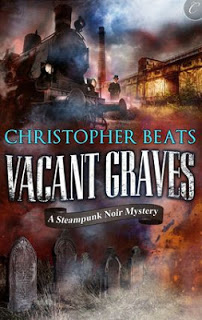Hi everybody, meet my friend Christopher Beats author, family man and historian by trade:
 |
| From his blog, The Quantum Rumba |
I am not an engineer. I know several and what’s more, they tend to read my stories. None of them are soft spoken, either, creating a kind of pressure–amplifying the pressure that’s already there really–to get my science right. They are the gearhead angels on my shoulder. Or demons, if you’re a Luddite.
I’m also not a Luddite. In fact I try to be a very science-minded person. Though my background is in liberal arts, I enjoy reading Astronomy and Discover and that magazine the Smithsonian Institute puts out. When a friend sends me an article about photosynthesizing salamanders, I pounce on it like a hungry jaguar.
So there is a certain lingering guilt in me when, while writing, I violate the laws of physics, biology or good sense. But as an author (not to mention a reader), I know that sometimes science can get in the way of a good story. People enjoy learning but that isn’t why they buy novels. This isn’t a new dilemma, of course. It’s not even unique to fiction. When Gordon Lightfoot was composing his masterpiece “The Wreck of the Edmond Fitzgerald,” he had problems getting his lyrics to jive with reality. He was only able to finish his song after a friend of his told him to drop the history and let his creativity guide him.
Steampunk is a thorny genre, even more so than other speculative fiction. We’re looking at what could have been instead of what will be or even what was. That means we have lots of sources to look at for inspiration, from the actual technology to the speculations of 19th century authors. The problem arises in combining those two sources to create a coherent system.
I posed the question of Science vs. Steampunk on several forums and not surprisingly, most people answered that the most important thing, by far, was a system that was coherent and consistent. The best works have a rational system, a system that the readers get to know well enough that they feel they can predict what will happen next. The best outcome, of course, is to make the reader feel so entrenched in your system that they can make predictions…but then sideswipe them with a logical but wholly unexpected surprise.
 |
I’d like to thank Christopher for stopping by His newest book Vacant Graves is out now. You can also find Facebook.
